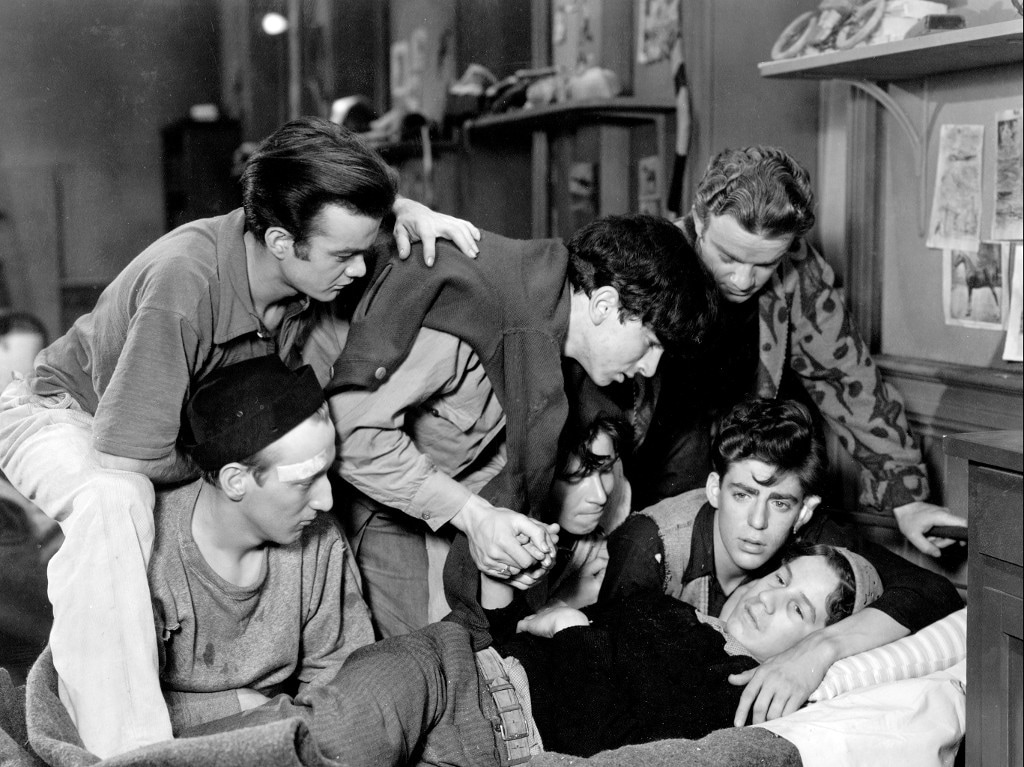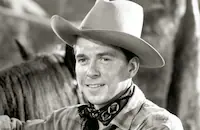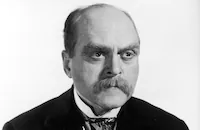Hell's Kitchen

Brief Synopsis
Cast & Crew
Lewis Seiler
Billy Halop
Bobby Jordan
Leo Gorcey
Huntz Hall
Gabriel Dell
Film Details
Technical Specs

Synopsis
Convicted New York racketeer Buck Caeser is awarded a suspended sentence on the condition that he remain a law-abiding citizen for a year. At the suggestion of his attorney, Jim Donahue, Buck becomes a supervisor at the Hudson Street Shelter boys' school. Buck's appointment is opposed by Hiram Krispan, the brutal superintendent of the school, who has been collecting money from philanthropic citizens and using it for his own purposes. Noticing the intolerable conditions at the school, Jim seeks out Beth Avery, a teacher whom Krispan had fired because of her compassion for the boys. When Beth tells Jim of Krispan's reign of terror, Buck rehires her, inspired by her visions of creating another Boys Town. Buck pours his own money into the school, and, among other things, he establishes a boys' hockey team. To dispose of Buck, Krispan joins forces with Mike Garvey, a rival racketeer. When Garvey learns that Buck has rented the Ice Palace for a hockey match with a local orphanage, Garvey secretly substitutes professional players for the orphans and challenges Buck to bet on the game. Garvey's plan incites Buck to violence, causing him to violate his probation and forcing him into hiding. In Buck's absence, Krispan resumes his despotic rule and orders Joey Richards, a sickly boy, locked in the freezer for punishment. When Joey dies from exposure, the boys revolt and sentence Krispan to death. Desperate, Beth calls Buck for help, and he risks his freedom to convince the boys to turn Krispan over to the law. On his way to prison to serve his sentence, Buck turns the school over to Beth and Jim and admonishes the boys to adhere to the path of law and order.

Cast

Billy Halop

Bobby Jordan

Leo Gorcey

Huntz Hall

Gabriel Dell
Bernard Punsley

Margaret Lindsay

Ronald Reagan
Stanley Fields
Frankie Burke

Grant Mitchell
Fred Tozere
Arthur Loft
Vera Lewis
Robert Homans
Charley Foy
Raymond Bailey

Clem Bevans

George Irving
Ila Rhodes
Robert Strange

Lee Phelps
Don Turner
Joe A. Devlin
Jimmie Lucas
Jack Kenney
Sol Gorss
Reid Kilpatrick

George O'hanlon
Charles Sullivan
Jack Gardner
Jimmy O'gatty
Ernie Stanton
Cliff Saum
Dick Rich

Tom Wilson
Sonny Noisom
George Offerman

Jack Mower
Max Hoffman Jr.
Ruth Robinson
Crew
Milo Anderson
Hugh Cummings
Bryan Foy
Mark Hellinger
William Kissell
Clarence Kolster
Fred Niblo Jr.
Hugh Reticker
Charles Rosher
Dolph Thomas
Jack L. Warner
Crane Wilbur
Crane Wilbur

Film Details
Technical Specs

Articles
Hell's Kitchen
Reagan later commented that, having heard "lurid tales from other actors" who had worked with the rowdy little mischief-makers, he approached his first movie with the Kids "in something of a sweat." James Cagney, who had not only acted with the Kids but hailed from the same tough New York area where most of them grew up, had this advice for Reagan: "Just tell them you look forward to working with them but you'll slap hell out of them if they do one thing out of line."
Although Reagan found Cagney's advice effective to a point, it didn't entirely save him from the Kids' abrasive pranks. Reagan was quoted as saying that filming with the boys was "an experience similar to going over Niagara Falls the hard way -- upstream. Counting noses and getting them all in one scene was a major chore, but sometimes it was a relief when they did take off and disappear for a few hours. You never knew when a canvas chair would go up in smoke or be blown apart by the giant firecrackers they were never without." One account has it that, during filming, the Kids placed a burning hat atop Reagan's head.
Hell's Kitchen has the Kids confined in the Hudson Shelter, a "Boys' Town"-type alternative to reform school where inmates form a democracy to govern themselves with the aid of social workers played by Reagan and Margaret Lindsay. Grant Mitchell, as the shelter's unscrupulous supervisor, has other ideas, treating the inmates so brutally that one of them (Bobby Jordan) dies after being locked in "the cooler" as punishment. This leads to a revolt, with the Dead End Kids at the center of the melodramatic action. The gang includes Billy Halop, Leo Gorcey, Huntz Hall, Gabriel Dell, Bernard Punsley and Frankie Burke, who had played James Cagney as a boy in Angels with Dirty Faces (1938) and retained an amazing likeness to the star as he grew older.
Hell's Kitchen was produced by Mark Hellinger, a New York journalist and screenwriter known for his street-savvy style, and Bryan Foy, a son of entertainer Eddie Foy and one of the "Seven Little Foys." Foy, because of his long association with "B" movies, earned the nickname "Keeper of the Bees." The film had two directors, Ewald Andre Dupont and Lewis Seiler. David Hayes and Brent Walker, authors of The Films of the Bowery Boys, consider that this may have led to the movie's slightly schizoid quality as it switches from earthy humor to social commentary.
Producers: Bryan Foy, Mark Hellinger
Directors: E.A. Dupont, Lewis Seiler
Screenplay: Fred Niblo, Jr., Crane Wilbur (from story by Wilbur)
Cinematography: Charles Rosher
Production Design: Hugh Reticker
Original Music: Ray Heindorf, Heinz Roemheld
Editing: Clarence Kolster
Costume Design: Milo Anderson
Principal Cast: Billy Halop (Tony Marco), Bobby Jordan (Joey Richards), Leo Gorcey (Gyp Haller), Huntz Hall (Bingo), Gabriel Dell (Ace), Bernard Punsly (Ouch/Patrick Henry Rosenbloom), Margaret Lindsay (Beth Avery), Ronald Reagan (Jim Donohue), Stanley Fields (Buck Caesar), Frankie Burke (Soap), Grant Mitchell (Hiram Krispin).
BW-82m.
by Roger Fristoe

Hell's Kitchen
Ronald Reagan, 1911-2004 - TCM Remembers Ronald Reagan
Ronald Reagan, the actor turned elected official whose fascinating career saw him develop as a contract player for Warner Brothers studios, to a politician who fulfilled his ambitions by becoming the 40th President of the United States, died at his home in Los Angeles on June 5 after a long battle with Alzheimer's disease. He was 93.
He was born Ronald Wilson Reagan on February 6, 1911 in Tampico, Illinois to John and Nelle Reagan. When Reagan was nine, his family settled down in the small community of Dixon, about 100 miles west of Chicago. After high school, Reagan enrolled in Eureka College, a small Christian school near Peoria. He graduated in 1932 with a degree in Economics, and pursued a career in broadcasting. His first gig was as a part-time announcer at WOC in Davenport, Iowa. Within a year, WOC had merged with its big-sister station, WHO in Des Moines, and Reagan was hired as a sports announcer.
In the spring of 1937, Reagan drove to Southern California to catch the Chicago Cubs in spring training on Santa Catalina Island. While he was in California, he wrangled a screen test and signed a contract for $200 a week with Warner Brothers. His film debut was rather inauspicious; he portrayed a radio announcer in an innocuous comedy Love is on the Air (1937). He made a few more "B" programmers like Hollywood Hotel (also 1937), and Girls on Probation (1938), before getting his first prominent role opposite Bette Davis in the popular tearjerker, Dark Victory (1939).
Although he seldom got credit for being a good actor, there was no denying that Reagan held his own given the right material: Knute Rockne, All American as the doomed Notre Dame football hero George "The Gipper" Gipp, where he delivered the film's immortal line "Win one for the Gipper!"; Santa Fe Trail in which he ably supports Errol Flynn in one of the boxoffice hits of its era (both 1940); Kings Row (1941), featuring one of his finest performances as a small-town playboy whose legs are amputated by a careless surgeon; and Desperate Journey (1942) where he again supported Flynn in an exciting action picture.
Due to his poor eyesight, Reagan didn't see any action in World War II, so the studio heads assigned him to star in a series of patriotic films produced by the First Motion Picture Unit of the Army Air Forces in Culver City. Between 1942-45, Reagan starred in over 400 of these films. After the war, Reagan still found some good roles: The Voice of the Turtle (1947) proved he had a deft hand at light comedy opposite Eleanor Parker; The Hasty Heart (1949) offered another underrated performance as he ably portrayed the Yank in John Patrick's much heralded wartime play; and Storm Warning (1950) was a slick melodrama that cast Reagan as a crusading District Attorney determined to bring the KKK in a small southern town, with the help of Doris Day and Ginger Rogers!
It was around this time that Reagan became involved in politics. In 1947, he began a five-year term as president of the Screen Actors Guild (SAG), and testified in October of that year before the newly formed House Un-American Activities Committee (HUAC). He identified suspected Communists Larry Parks, Howard Da Silva and Alexander Knox, all of whom were subsequently called to testify, and subsequently blacklisted. Later records showed Reagan was so concerned about the Communist influence in Hollywood, that he became an FBI informer.
As Reagan became steeped in his political career, his parts throughout the '50s became inferior: the notorious Bedtime for Bonzo (1951); the coy "sex" comedy She's Working Her Way Through College (1952) that cast him as a college professor who romances a stripper! (Virginia Mayo); Cattle Queen of Montana (1955), a sluggish Western that even the redoubtable Barbara Stanwyck couldn't save; and finally Hellcats of the Navy (1957), a stodgy war picture that would be his only film that co-starred his wife Nancy (Davis).
Television offered some salvation. For eight years, (1954-62), Reagan served as the host of General Electric Theater, a televised series of dramas. He also found a niche as GE's goodwill ambassador to employees and to civic and business groups around the country, furthering his taste and honing his craft as a public official. By the mid '60s, Reagan would move into politics entirely, save for one last film, the thrilling The Killers (1964), Reagan's only known villainous role, as a murderous gangster. That same year, he actively campaigned for Republican Presidential candidate Barry Goldwater, although Goldwater lost to Lyndon B. Johnson.
Reagan whose profile was riding high, had cemented his future as a successful politician. In 1966, he ran against incumbent Governor Pat Brown for the state of California and won, serving successfully for two terms until 1974.
Reagan began an all-out, two-year drive to wrest the 1976 nomination from incumbent Gerald R. Ford, an appointed vice president who became president on the resignation of Nixon. Reagan fell short by a handful of delegates to the Republican national convention. But Ford lost to Jimmy Carter, and Reagan became the front-runner to challenge Carter in 1980. After defeating Carter, Reagan held two terms as President of the United States (1981-89). After his second term was over, he retired quietly in California. In 1994, it was revealed to the media that Reagan was suffering from Alzheimer's disease; he had been kept out of the public eye since then.
He was married briefly to actress Jane Wyman (1940-48), and had two children; a daughter Maureen and an adopted son, Michael. In 1952, he married a budding film starlet, Nancy Davis, who bore him two more children; a daughter, Patty; and a son, Ronald Jr. Ronald Reagan is survived by Nancy, Michael, Patty and Ron Jr. His daughter Maureen died of Melanoma in 2001 at the age of 60.
by Michael T. Toole
Ronald Reagan, 1911-2004 - TCM Remembers Ronald Reagan
Quotes
Trivia
Don Turner (Chick), Robert Strange (Callahan) and Jimmy O'Gatty (Mug) are listed in studio records for those roles, but were not seen in the movie.
As a result of a PTA complaint, this was the last gangster angle picture made by The Dead End Kids.
Notes
Sources conflict over the producer of this film. Although the onscreen credits do not contain a producer credit, Variety lists Mark Hellinger as producer and Bryan Foy as associate producer, while Daily Variety and Screen Achievements Bulletin list Hellinger as associate producer and Foy as producer. According to the Variety review, this was the last gangster angle picture for the Dead End Kids because of complaints registered by the PTA. A news item in Hollywood Reporter adds that the film had a benefit performance for the Grant Street Boys, an East Side group for impoverished boys. Part of the proceeds went to finance a summer camp for poor children. For additional information about the series, see entry above for Crime School, and consult the Series Index for "The Dead End Kids," "The East Side Kids" and "The Little Tough Guys."

Miscellaneous Notes
Released in United States Summer July 8, 1939
Released in United States Summer July 8, 1939














